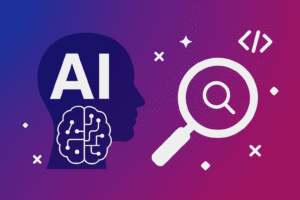Search is evolving faster than ever before. Gone are the days when SEO meant just keywords and backlinks. In 2025, AI-driven search engines — like Google SGE (Search Generative Experience), ChatGPT, Microsoft Copilot, and Gemini — are reshaping how content is found and consumed.

If you want your website to stay visible and competitive, it’s time to optimize for AI-powered search instead of just traditional algorithms.
What Are AI-Driven Search Engines?
AI-driven search engines use machine learning, NLP (Natural Language Processing), and generative AI to understand context, user intent, and conversational queries.
Unlike the old keyword-based search, these engines generate answers directly — pulling insights from multiple trusted sources.
For example:
-
Google SGE provides summarized responses before regular results.
-
ChatGPT Search answers user queries conversationally using data from across the web.
-
Microsoft Copilot integrates with Bing and Edge to deliver interactive responses.
That means your content needs to be optimized not just for ranking—but for being understood and cited by AI systems.
Why AI Search Optimization Matters in 2025
In 2025, over 70% of online users interact with AI-based search results before clicking a website.
So if your content isn’t optimized for these engines, you risk losing visibility — even if your SEO is perfect for Google’s traditional results.
Benefits of optimizing for AI-driven search:
-
Higher visibility in conversational answers
-
Better chances of being cited in AI-generated summaries
-
More relevant traffic and improved engagement
-
Long-term SEO stability as algorithms evolve
How to Optimize for AI-Driven Search Engines in 2025
Let’s break down the strategies that actually work for AI-first SEO in 2025.
1. Focus on E-E-A-T: Expertise, Experience, Authoritativeness, and Trustworthiness
AI systems prioritize credible and expert-backed content.
✅ Tips:
-
Write with real-world expertise (use author bios and credentials)
-
Add case studies, statistics, and original research
-
Build author profiles with verified social links and photos
-
Use reliable outbound links to trusted websites
When AI models evaluate sources, they’re more likely to choose human-authored, experience-rich content over generic text.
2. Optimize for Conversational and Long-Tail Queries
People now search using natural language — not short keywords.
✅ Examples:
-
Old SEO: “best SEO tips 2024”
-
AI SEO: “How can I optimize my content for AI-driven search engines in 2025?”
✅ Tips:
-
Use question-style headers (H2, H3)
-
Include FAQs in your content
-
Write in a conversational tone
-
Answer related questions in one article
AI search models like ChatGPT pull answers from comprehensive and context-aware articles.
3. Create Content That AI Can Understand and Reuse
AI tools love structured and semantically rich data.
✅ Steps to follow:
-
Use schema markup (FAQ, How-To, Article)
-
Include lists, bullet points, and tables
-
Keep paragraphs under 100 words
-
Use clear subheadings for each section
The easier your content is to interpret, the higher the chances it will be summarized or cited in AI-generated results.
4. Leverage Multimedia and Contextual Content
In 2025, AI search algorithms analyze images, videos, and audio alongside text.
✅ How to optimize:
-
Use alt text that describes context, not just keywords
-
Add video transcripts and interactive visuals
-
Create explainer videos or infographics to boost engagement
Generative search prefers rich, multi-format content that adds value.
5. Improve Website Experience and Speed
Even AI models consider page experience as a trust signal.
✅ Focus on:
-
Mobile-first design
-
Fast loading speed (under 2.5 seconds)
-
Secure HTTPS connection
-
Clean and accessible layout
User satisfaction = better engagement = stronger AI visibility.
6. Build an Entity-Based SEO Strategy
Instead of targeting single keywords, AI engines use entity recognition — understanding the meaning behind names, places, and brands.
✅ To optimize:
-
Add structured data for your brand and services
-
Create Wikipedia-style clarity around your business
-
Use consistent NAP (Name, Address, Phone) across all listings
-
Get featured in relevant directories and industry mentions
Entities help AI recognize your authority and connect your content to relevant topics.
7. Optimize for Generative Summaries
To appear in AI-generated answers, you must structure your content for summarization.
✅ Pro tips:
-
Include direct, concise answers at the start of sections
-
Use clear formatting (bold, lists, quotes)
-
Write content that can be easily quoted
AI systems like Google SGE often extract precise, factual sentences — make yours stand out.
8. Refresh and Update Content Regularly
AI search engines prioritize freshness and reliability.
✅ Steps:
-
Update articles every 3–6 months
-
Add new statistics or trends
-
Monitor AI search results and adjust accordingly
Keeping your content fresh helps it stay relevant in dynamic AI-driven results.
Bonus Tip: Optimize for Both Google and Generative AI
In 2025, the best-performing content combines traditional SEO and AI-optimization.
✅ Dual Strategy:
-
Use keywords + semantic phrases
-
Write natural, human-like language
-
Optimize meta tags and structured data
-
Focus on topic clusters and internal linking
This approach ensures visibility on both Google SERPs and AI summary boxes.
Conclusion: The Future of SEO is AI-First
As we move into 2025 and beyond, AI-driven search optimization is no longer optional — it’s essential.
By focusing on E-E-A-T, conversational intent, structured content, and AI readability, you can future-proof your online presence and maintain consistent visibility across all platforms.
✅ Key takeaway: Write content that’s helpful for humans and understandable for machines.
Call-to-Action
Want to prepare your website for AI search engines in 2025?
Start optimizing today with our AI-SEO audit and content strategy service — let’s make your content the one that AI loves to rank and recommend!
👉 Contact us now to future-proof your digital visibility.
